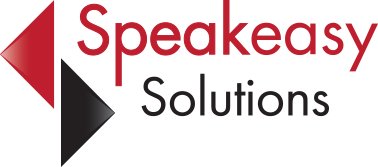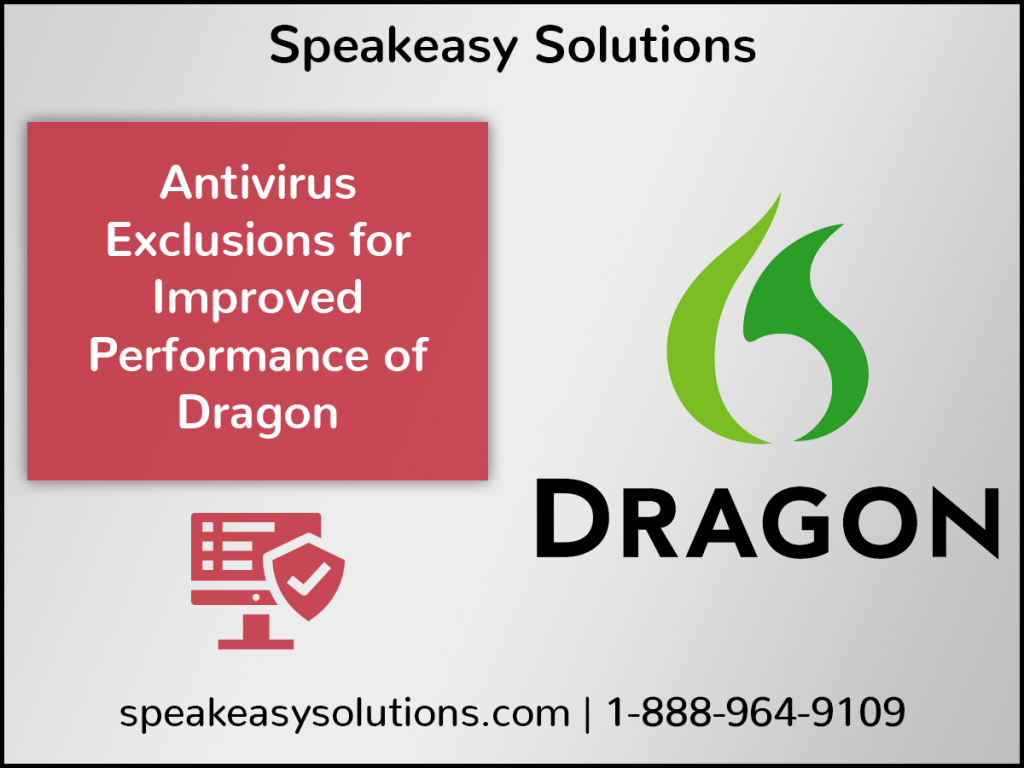As mentioned in our article Antivirus Effects on Dragon an Antivirus is critical in the performance of your computer’s Operating System and its hosted applications. As Dragon’s plugins insinuate into various applications such as Microsoft Office, Dragon’s speed and accuracy are very much influenced by the computer’s resident antivirus.
Not all antivirus applications provide the same level of protection and impact on your computer.
Additionally, and the focus of this blog post, setting exclusions within your antivirus enable Dragon to function unfettered by the regular effects of the antivirus. That said, even with antivirus exclusions, a number of antivirus applications continue to slow the computer down.
Antivirus Applications
Consumer Products
Antivirus applications heavily impact the operation of Dragon. Depending on your current antivirus, a change in antivirus application may be worth considering.
- Free antivirus applications are not recommended.
- AVAST can be problematic with Dragon on some occasions.
- Norton and Mcafee negatively impact Dragon’s performance.
- Running more than one antivirus and security application concurrently is not recommended.
Read more about antivirus software and its impact on a computer’s performance in this blog post.
Windows Defender (built into Windows 10 operating system)
While Windows Defender is reportedly effective, its malware capabilities seem to fall short according to a variety of technical publications. As a result, individuals who opt to use Windows Defender are encouraged by these technical publications to purchase an additional malware software package.
With more than one antivirus/malware package on a computer system, you potentially run the risk of creating a negative impact on other programs such as Dragon. While this is not assured, there is a potential.
Speakeasy Solutions Recommendation
Speakeasy Solutions recommends ESET’s Smart Security Premium for its minimal footprint, zero impact on the operation of other applications, and its superlatives qualities as an antivirus and anti-malware product.
Antivirus Exclusions
Introduction
It is important to understand that antivirus exclusions and optimizations increase the attack surface of a system and might expose computers to a variety of real security threats. However, the following guidelines typically represent the best trade-off between security and performance.
Speakeasy Solutions and Nuance do not recommend implementing any of these exclusions or optimizations until rigorous testing has been conducted in a lab environment to thoroughly understand the trade-offs between security and performance. Speakeasy Solutions and Nuance also recommend organizations to engage their antivirus and security teams to review the following guidelines before proceeding with any type of production deployment.
If organizations choose to exclude particular files or folders as part of real-time or on-access scanning, Speakeasy Solutions and Nuance recommend scanning the excluded files and folders on a regular basis using scheduled scans. It is recommended to perform scheduled scans during non-business or off-peak hours to mitigate any potential performance impact.
General Recommendations
The following anti-virus recommendations are provided for these Dragon products:
- Dragon Professional Individual
- Dragon Legal Individual
Speakeasy Solutions and Nuance recommend installing anti-virus software on all Dragon clients for obvious protection of the customer system from potential downtime due to malware.
However, please note that the following recommended folder, process, and file exclusions should be removed from any anti-virus scans. Observing these recommended exclusions will ensure the proper operation of the Dragon components.
Dragon Exclusions
Ensure that the following Dragon Professional Individual anti-virus folder, process, and file exclusions are provided for on all Windows workstations where Dragon is running.
All exclusions must be applied to cover all subordinate folders, sub-folders and files for the directory paths listed below. Also, be sure to specifically exclude the executable processes specified, even if they reside in a folder that was identified for exclusion.
File Extensions
Exclude files with these extensions:
BD, BIN, DAT, DVC, ENH, GSB, GRM, GRX, INI, LCK, NWV, SIG, SVC, USR, VER, VOC, WAV, XML, LOG, ini_DGNRenamed, voc_DGNRenamed
Process Executables
Exclude the following client processes from real-time process monitoring (see below for details specific to Bit9):
- [Common Files Folder – C:\Program Files (x86)\Common Files]\Nuance\NaturallySpeakingXX\dgnuiasvr.exe
- [Common Files Folder – C:\Program Files (x86)\Common Files]\Nuance\NaturallySpeakingXX\dragonbar.exe
- [Common Files Folder – C:\Program Files (x86)\Common Files]\Nuance\NaturallySpeakingXX\x64\dgnuiasvr_x64.exe
- [Common Files Folder – C:\Program Files (x86)\Common Files]\Nuance\dgnsvc.exe
- [Program Files Folder – C:\Program Files (x86)\Nuance\NaturallySpeaking15\Program]\Nuance\NaturallySpeakingXX\Program\natspeak.exe
kernelProcessExclusions
Bit9 uses the terminology “kernel level filters” or “kernel process exclusions” – an example value for the “kernelProcessExclusions” parameter is shown immediately below:
- *\Program Files*\Nuance\naturallyspeaking*\natspeak.exe:259967,
- *\Program Files*\Nuance\naturallyspeaking*\dgnuiasvr.exe:259967,
- *\Program Files*\Nuance\naturallyspeaking*\dgnuiasvr_x64.exe:259967,
- *\Program Files*\Nuance\naturallyspeaking*\citrixwindowmgr.exe:259967
After the exclusions have been added to a client computer, the workstation should be rebooted.

